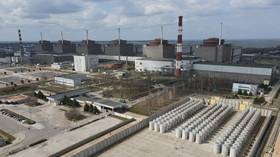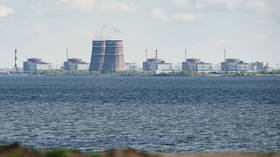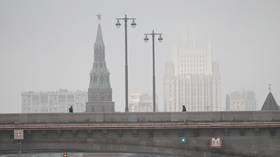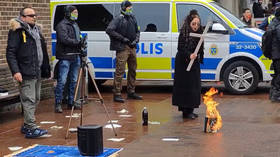Moscow rejects nuclear power theft claims

Claims by Ukrainian officials and a former US embassy employee about Moscow bombing the Zaporozhye nuclear power plant in order to “steal” Ukraine’s electricity – published by the Wall Street Journal – make no sense, the Russian Foreign Ministry said on Tuesday.
Recent artillery attacks on the Zaporozhye NPP, which Moscow controls, are a “deliberate step in Russia’s wider goal: stealing [Zaporozhye’s] power by severing its connection to Ukraine’s remaining territory,” the WSJ claimed on Sunday, citing “Ukrainian leaders, international nuclear-power experts and the plant’s staff.”
Those quoted on the record include Mikhail Podolyak, adviser to Ukrainian President Vladimir Zelensky, and former “energy chief at the US embassy” in Kiev, Suriya Jayanti. The Journal also claims to have spoken with “plant workers, family members and colleagues who fled to safety” – meaning, Ukrainian-held territory.
Jayanti claimed that Russia wants to disconnect the ZNPP from Ukraine’s electrical grid in order to destabilize global energy markets but also leave Kiev dependent on the EU, where electricity prices are skyrocketing – while omitting to mention that this is largely due to anti-Russian sanctions.
The report is “a complete demolition of the connection between cause and effect,” the Russian Foreign Ministry said on Tuesday, dubbing the WSJ claims “the latest spin of the wheel of disinformation.”
Ukraine has repeatedly targeted the nuclear power plant with artillery, rockets and even kamikaze drones, the ministry noted, adding that Russia has presented evidence of this to the International Atomic Energy Agency (IAEA) and the UN Security Council, among others. Ukrainian forces were also accused of bombing the Kakhovskaya hydroelectic power station – also under Russian control – which supplies the ZNPP with cooling water.
On Tuesday, local administration member Vladimir Rogov told Russian TV that the latest Ukrainian attack came close to breaking a container storing spent nuclear fuel. A strike on the structure would amount to a “dirty bomb,” Rogov said.
A release from 20-30 containers would create a radiation plume that could spread as far west as the Czech Republic and as far south as Turkey, affecting Poland and the Baltic States as well, former Soviet nuclear inspector Vladimir Kuznetsov told RT on Tuesday.
“The conclusion suggests itself: by destroying the energy infrastructure, the Kiev regime is exposing the many millions of people on the European continent to the danger of a nuclear cataclysm, with the connivance of Washington,” the Russian Foreign Ministry said, noting that the WSJ, located across the ocean, clearly doesn’t seem to care.














